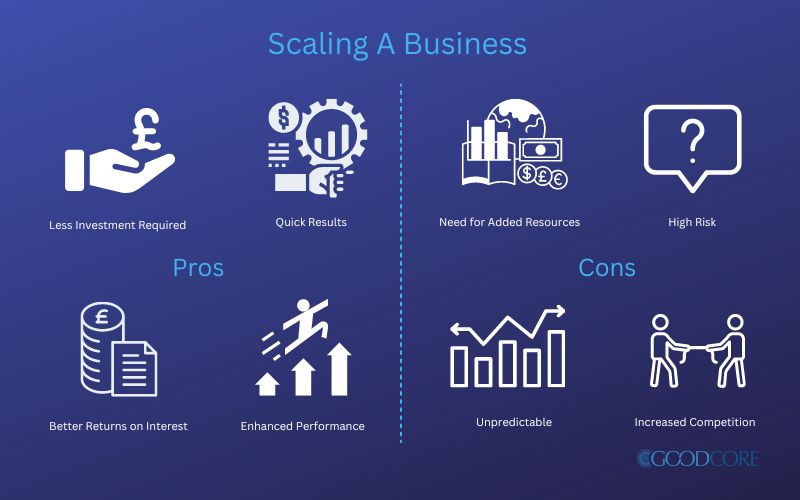Building a Strong Foundation: Essential Elements for Scalability
A scalable startup requires a strong foundation, comprising a solid business model, a talented team, and a robust infrastructure. These essential elements are critical for supporting rapid growth and ensuring long-term success. Startups that have successfully scaled, such as Airbnb and Uber, share common characteristics, including a clear vision, a strong company culture, and a focus on innovation.
A solid business model is the backbone of any successful startup. It should be designed to scale, with a clear revenue stream, a well-defined value proposition, and a competitive advantage. A talented team is also crucial, with a mix of skills, expertise, and experience that can drive growth and innovation. Finally, a robust infrastructure, including technology, systems, and processes, is necessary to support rapid growth and ensure efficiency.
Startups that have successfully scaled have also invested heavily in building a strong company culture. This includes creating a positive work environment, fostering a sense of community, and encouraging innovation and experimentation. A strong company culture is critical for attracting and retaining top talent, driving engagement and motivation, and ensuring that the startup remains agile and adaptable in the face of rapid growth.
In addition to these essential elements, startups that have successfully scaled have also demonstrated a focus on innovation and experimentation. This includes embracing new technologies, testing new business models, and continuously iterating and improving products and services. By fostering a culture of innovation and experimentation, startups can stay ahead of the competition, drive growth, and achieve long-term success.
How to Develop a Scalable Business Model
Developing a scalable business model is crucial for startups that want to achieve rapid growth and long-term success. A scalable business model is one that can be easily replicated and expanded as the business grows, without sacrificing efficiency or profitability. To develop a scalable business model, entrepreneurs must first identify and validate their assumptions about the market, the competition, and the customer.
This involves conducting thorough market research, gathering feedback from potential customers, and testing and iterating on the business model. Once the assumptions have been validated, entrepreneurs can create a minimum viable product (MVP) that meets the needs of the target market. The MVP should be designed to be scalable, with a clear revenue stream and a competitive advantage.
Designing a revenue model that can grow with the business is also critical. This involves identifying multiple revenue streams, such as subscription-based models, advertising, and transaction fees. The revenue model should be designed to be flexible and adaptable, with the ability to pivot quickly in response to changes in the market or the competition.
Finally, entrepreneurs must continuously iterate and improve the business model, based on feedback from customers and the market. This involves monitoring key metrics, such as customer acquisition costs, retention rates, and revenue growth, and making data-driven decisions to optimize the business model.
By following these steps, entrepreneurs can develop a scalable business model that drives growth and profitability, and sets the stage for long-term success. Whether you’re just starting out or are already scaling your startup, a scalable business model is essential for achieving your goals and realizing your vision.
Assembling a Dream Team: Hiring and Managing for Growth
Assembling a dream team is crucial for startups that want to scale quickly and efficiently. A talented and diverse team can help drive growth, innovation, and success. However, hiring and managing top talent can be a challenging task, especially for startups with limited resources.
To build a dream team, startups must first identify the key skills and expertise needed to drive growth. This involves creating a clear job description, outlining the responsibilities and requirements of the role, and identifying the key performance indicators (KPIs) that will measure success.
Once the job description is created, startups can begin the hiring process. This involves sourcing top talent through various channels, such as social media, job boards, and employee referrals. Startups must also develop a compelling employer value proposition (EVP) that showcases the company culture, mission, and values.
Managing a dream team requires effective leadership, clear communication, and a positive company culture. Startups must create an environment that fosters innovation, creativity, and collaboration. This involves providing ongoing training and development opportunities, recognizing and rewarding outstanding performance, and encouraging open communication and feedback.
Additionally, startups must also prioritize diversity and inclusion when building their team. A diverse team brings different perspectives, ideas, and experiences, which can drive innovation and growth. Startups must create a culture that values and celebrates diversity, and provides opportunities for underrepresented groups to succeed.
By assembling a dream team and managing them effectively, startups can drive growth, innovation, and success. Whether you’re just starting out or are already scaling your startup, building a talented and diverse team is essential for achieving your goals and realizing your vision.
Scaling Your Marketing Efforts for Maximum Impact
Marketing plays a crucial role in driving growth and scaling a startup. As the business grows, the marketing efforts must also scale to reach new customers, build brand awareness, and drive revenue. However, scaling marketing efforts can be a challenging task, especially for startups with limited resources.
To scale marketing efforts, startups must first identify their target audience and create a clear marketing strategy that aligns with their business goals. This involves conducting market research, analyzing customer data, and developing a unique value proposition that resonates with the target audience.
Once the marketing strategy is in place, startups can leverage various marketing channels to reach new customers and build brand awareness. Social media marketing, content marketing, and paid advertising are effective channels for scaling marketing efforts. Startups can use social media platforms to reach a large audience, create engaging content to attract and retain customers, and use paid advertising to drive traffic and generate leads.
In addition to leveraging marketing channels, startups must also measure and track the effectiveness of their marketing efforts. This involves setting clear key performance indicators (KPIs), tracking website analytics, and monitoring social media metrics. By measuring and tracking marketing efforts, startups can make data-driven decisions to optimize their marketing strategy and improve their return on investment (ROI).
Furthermore, startups must also prioritize customer experience and customer retention when scaling marketing efforts. This involves creating a customer-centric marketing strategy that focuses on building strong relationships with customers, providing excellent customer service, and offering personalized experiences. By prioritizing customer experience and customer retention, startups can build a loyal customer base that drives growth and revenue.
By scaling marketing efforts effectively, startups can drive growth, build brand awareness, and drive revenue. Whether you’re just starting out or are already scaling your startup, scaling marketing efforts is essential for achieving your business goals and realizing your vision.
Optimizing Operations for Efficiency and Growth
As a startup scales, its operations must also become more efficient and effective to support growth. Optimizing operations involves streamlining processes, managing cash flow, and leveraging technology to automate tasks and improve productivity. By optimizing operations, startups can reduce costs, improve customer satisfaction, and increase revenue.
One key area to focus on is process optimization. This involves identifying and eliminating unnecessary steps, automating repetitive tasks, and implementing efficient workflows. Startups can use tools like process mapping and workflow management software to identify areas for improvement and implement changes.
Another important area is cash flow management. As a startup grows, its cash flow needs will also increase. Startups must manage their cash flow carefully to ensure they have enough funds to invest in growth initiatives. This involves creating a cash flow forecast, managing accounts receivable and payable, and maintaining a cash reserve.
Leveraging technology is also critical for optimizing operations. Startups can use technology to automate tasks, improve productivity, and enhance customer experience. For example, they can use customer relationship management (CRM) software to manage customer interactions, marketing automation software to streamline marketing campaigns, and project management software to track progress and collaborate with team members.
In addition to these strategies, startups must also prioritize scalability when optimizing operations. This involves designing systems and processes that can grow with the business, rather than becoming bottlenecks as the business expands. By prioritizing scalability, startups can ensure that their operations can support rapid growth and expansion.
By optimizing operations for efficiency and growth, startups can position themselves for long-term success. Whether you’re just starting out or are already scaling your startup, optimizing operations is essential for achieving your business goals and realizing your vision.
Measuring and Monitoring Progress: Key Metrics for Growth
As a startup scales, it’s essential to measure and monitor progress to ensure that the business is on track to meet its goals. Key metrics provide valuable insights into the performance of the business, helping entrepreneurs make data-driven decisions to drive growth and improvement. By tracking the right metrics, startups can identify areas of strength and weakness, optimize their operations, and make adjustments to their strategy as needed.
One of the most important metrics for startups is customer acquisition cost (CAC). This metric measures the cost of acquiring a new customer, including marketing and sales expenses. By tracking CAC, startups can determine the effectiveness of their marketing and sales efforts and make adjustments to optimize their customer acquisition strategy.
Another critical metric is retention rate. This metric measures the percentage of customers who remain loyal to the business over time. By tracking retention rate, startups can identify areas for improvement in their customer service and support, and make adjustments to increase customer satisfaction and loyalty.
Revenue growth is also a key metric for startups. This metric measures the rate at which the business is generating revenue, and provides insights into the effectiveness of the business model and pricing strategy. By tracking revenue growth, startups can identify areas for improvement in their sales and marketing efforts, and make adjustments to optimize their revenue stream.
In addition to these metrics, startups should also track other key performance indicators (KPIs) such as website traffic, social media engagement, and customer satisfaction. By tracking these metrics, startups can gain a comprehensive understanding of their business performance and make data-driven decisions to drive growth and improvement.
By measuring and monitoring progress, startups can ensure that they are on track to meet their goals and achieve long-term success. Whether you’re just starting out or are already scaling your startup, tracking key metrics is essential for making data-driven decisions and driving growth.
Overcoming Common Challenges and Avoiding Pitfalls
Scaling a startup can be a challenging and complex process, and there are several common challenges that entrepreneurs may face along the way. One of the most significant challenges is managing growth pains, which can include scaling the team, managing cash flow, and maintaining a strong company culture.
To overcome growth pains, entrepreneurs must be proactive and strategic in their approach. This includes identifying potential challenges early on, developing a plan to address them, and being flexible and adaptable as the business grows. Additionally, entrepreneurs must prioritize communication and transparency, ensuring that all team members are aligned and working towards the same goals.
Another common challenge that startups face is avoiding burnout. As the business grows, entrepreneurs and team members may be tempted to work longer hours and take on more responsibilities, which can lead to burnout and decreased productivity. To avoid burnout, entrepreneurs must prioritize self-care and wellness, including taking breaks, exercising regularly, and seeking support from mentors and peers.
Maintaining a strong company culture is also critical as a startup scales. This includes prioritizing values and mission, fostering open communication and collaboration, and recognizing and rewarding outstanding performance. By maintaining a strong company culture, entrepreneurs can ensure that their team is motivated, engaged, and working towards the same goals.
Finally, entrepreneurs must be aware of common pitfalls that can derail a scaling startup, including poor financial management, inadequate infrastructure, and ineffective leadership. By being aware of these potential pitfalls, entrepreneurs can take steps to avoid them and ensure that their business is well-positioned for long-term success.
By overcoming common challenges and avoiding pitfalls, entrepreneurs can ensure that their startup is well-positioned for long-term success. Whether you’re just starting out or are already scaling your startup, being aware of these common challenges and pitfalls is essential for achieving your goals and realizing your vision.
Scaling Your Startup for Success: Putting it all Together
Scaling a startup requires a combination of strategic planning, effective execution, and a willingness to adapt to changing circumstances. By understanding the different stages of scaling, building a strong foundation, developing a scalable business model, assembling a dream team, scaling marketing efforts, optimizing operations, measuring and monitoring progress, and overcoming common challenges, entrepreneurs can set their startups up for long-term success.
Remember, scaling a startup is a journey, not a destination. It takes time, effort, and perseverance to build a successful business. But with the right mindset, strategies, and support, entrepreneurs can overcome the challenges of scaling and achieve their goals.
By following the proven growth strategy outlined in this article, entrepreneurs can increase their chances of success and build a scalable business that drives growth and revenue. Whether you’re just starting out or are already scaling your startup, this article provides valuable insights and practical advice to help you achieve your goals.
In conclusion, scaling a startup requires a comprehensive approach that addresses all aspects of the business. By focusing on the key elements outlined in this article, entrepreneurs can build a strong foundation, drive growth, and achieve long-term success.








